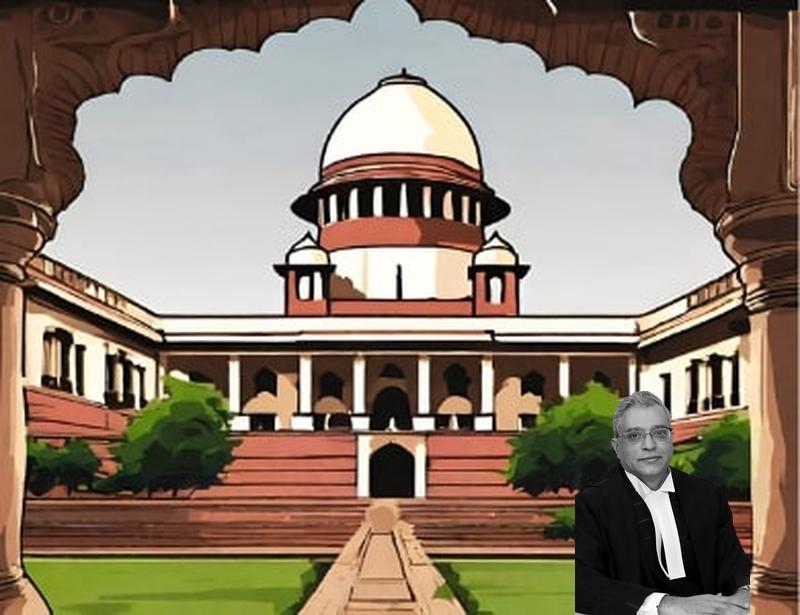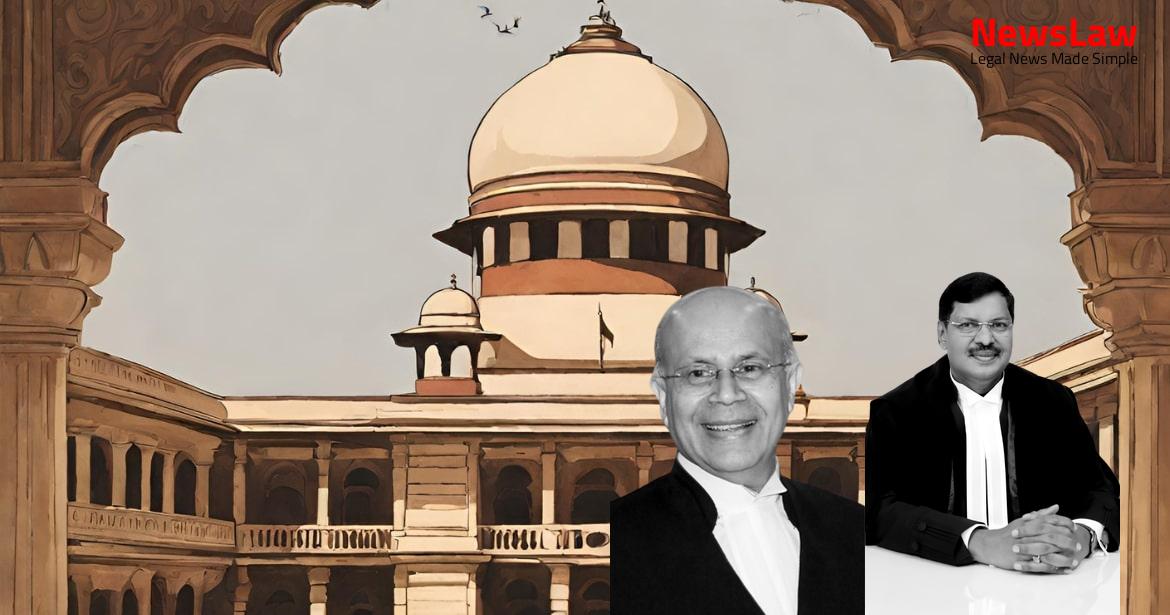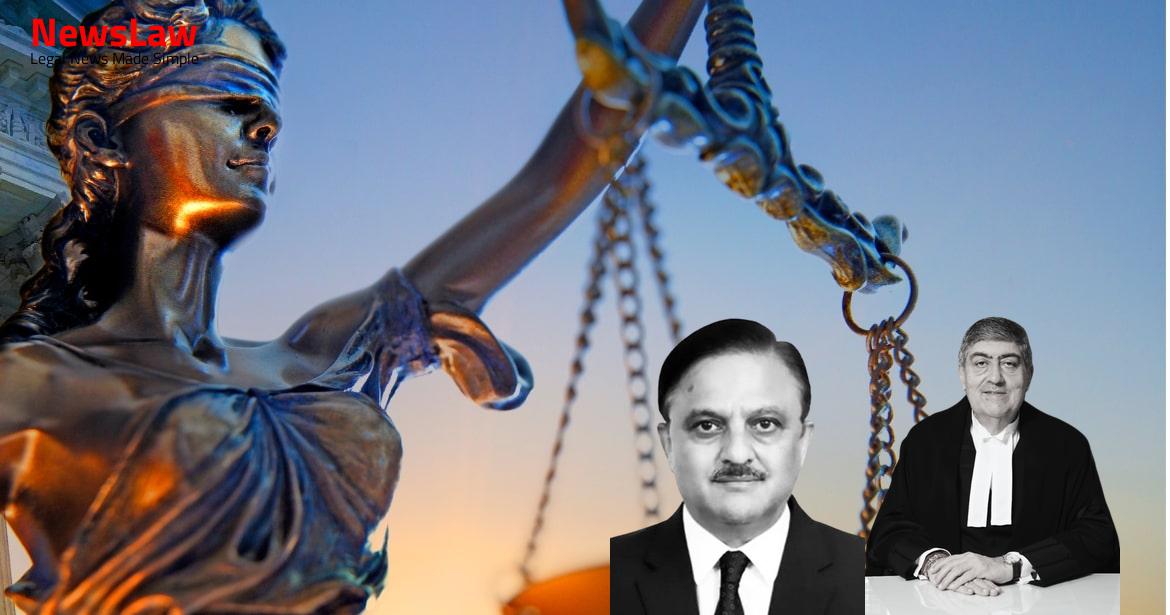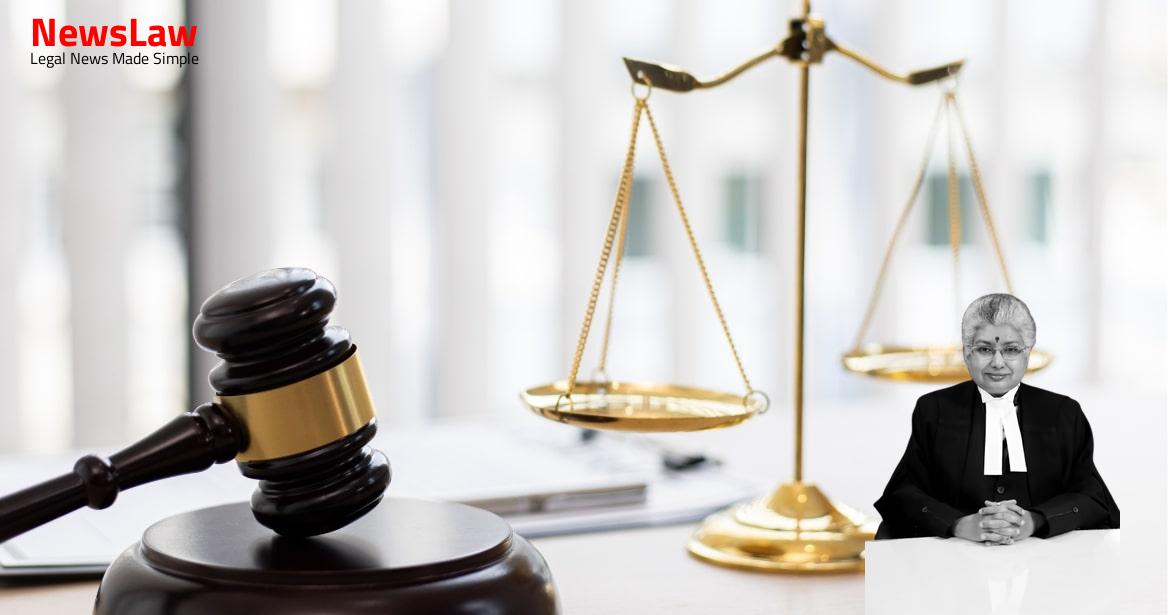The appellants have also challenged the order of the High Court dated 22.11.2013, by which the review petition of the appellants seeking a review of the order dated 21.02.2013 was dismissed, though certain observations made in the earlier order were recalled.
The allegations against him were that,– on the fateful day, the lady doctor requested him to leave her quarter as she were to take a bath; while she was bathing, she noticed through the window of her bathroom two camera flashes; suspecting foul play, she raised an alarm; on her alarm, her mother went out but could find none; later, the matter was reported to the Chief Medical Officer; the BSF authorities investigated the matter and put the original petitioner under open arrest. In the appeal, the original petitioner refuted the allegations of clicking pictures of the lady doctor while she was taking her bath and claimed that,– while recording the evidence, the prosecution witnesses were not offered for cross-examination; there was no evidence forthcoming against the original petitioner in the testimony of prosecution witnesses; the reel of the camera allegedly used in commission of the offence was not developed; the statement of PW-9 with regard to concealment of the camera in her house by the original petitioner was contradictory to her previous statement where no such allegation was levelled by her; nothing incriminating was recovered from the possession of the original petitioner; the statement of prosecution witnesses indicated that the original petitioner had denied the allegations levelled against him, therefore, there was no reason for making a confessional statement, hence, the same cannot be the sole basis for the punishment. Aggrieved by dismissal of his appeal, the original petitioner filed writ petition before the High Court.
The High Court observed that the SSFC was not only convened but also presided over by the Commandant of the original petitioner which vitiated the proceedings of the SSFC. PW-9 did not mention anything about any camera or the petitioner having asked her to hide it, when officials enquired from her. The next day, PW-9 made another statement, leading to recovery of the camera. Taking all the aforesaid circumstances as well as the plea that no confession was made by the original petitioner into consideration, the High Court opined that there was no worthwhile evidence against the original petitioner as to weigh on him to admit his guilt. After the writ petition was allowed by the High Court, the appellants herein filed a review petition claiming therein that the view taken by the High Court that there was infraction of Rules 60 and 61 of the BSF Rules, 1969 is erroneous because those provisions get attracted only if the trial is by a “General” or a “Petty” Security Force Court, whereas the original petitioner was tried by a “Summary” Security Force Court in terms of section 70 of the BSF Act, 1968. The learned counsel for the appellants submitted: (a) The High Court exceeded its jurisdiction by appreciating the evidence led while preparing the record of evidence when the SSFC decided the matter on acceptance of guilt by the original petitioner.
Per Contra, on behalf of the respondent it was submitted that the order passed by the High Court is just and proper based on appreciation of the materials on record. Moreover, taking into account that there was no eyewitness of photographs being clicked by the original petitioner and no incriminating object or article was recovered from the original petitioner’s possession, there was no reason for the original petitioner to accept his guilt.
Moreover, it was recorded on the same day when the deposition of the last witness was recorded, that is, without giving 24 hours’ time for reflection, as is the mandate of the proviso to sub-rule (3) of Rule 49 of the BSF Rules, 1969; (ii) When the confession was recorded, the original petitioner was under open arrest, therefore such a confession would be hit by Section 26 of the Indian Evidence Act, 1872 which becomes applicable by virtue of Section 87 of the BSF Act, 1968; (iii) The SSFC comprised of the Commandant of the accused as such he was disqualified from being a part of the Court by virtue of Rule 60 of the BSF Rules, 1969.
As we notice that the order of dismissal from service was based on original petitioner’s acceptance of his guilt before the SSFC, before proceeding further, it would be useful to have a glimpse of the relevant provisions of the BSF Act, 1968 and the BSF Rules, 1969 concerning a “Security Force Court” and proceedings before it. Section 87, which applies to all kinds of Security Force Courts, provides that the Indian Evidence Act, 1872 (Act No 1 of 1872) shall, subject to the provisions of the BSF Act, 1968, apply to all proceedings before a Security Force Court.
Punishments awardable by a Security Force Court are specified in Section 48 of the BSF Act, 1968 which, inter-alia, includes the power to dismiss from service. (k) any matter necessary for the purpose of carrying this Act into execution, as far as it relates to the investigation, arrest, custody, trial, and punishment of offences triable or punishable under this Act (l)…… Hearing of the charge against an enrolled person.— (1) The charge shall be heard by the Commandant of the accused in the following manner: – (i) The charge and statements of witnesses, if recorded, shall be read over to the accused; (ii) If written statements of witnesses are not available, or where the considers it necessary to call any witness, he shall hear as many witnesses as he may consider essential to enable him to determine the issue; (iii) Wherever witnesses are called by the Commandant, the accused shall be given opportunity to cross-examine them; (iv) Thereafter, the accused shall be given an opportunity to make a statement in his defence. (2) After hearing the charge under sub-rule (1), the Commandant may— (i) award any of the punishments which he is empowered to award, or (ii) dismiss the charge, or (iii) remand the accused, for preparing a record of evidence or for preparation of an abstract of evidence against him, or (iv) remand him for trial by a Summary Security Force Court:
Provided that, in case where the Commandant awards more than 7 days’ of imprisonment or detention he shall record the substance of evidence and the defence of the accused…” 24. (6)(a) The statements given by witnesses shall ordinarily be recorded in narrative form and the officer recording the evidence may, at the request of the accused, permit any portion of the evidence to be recorded in the form of question and answer; (b) The witnesses shall sign their statements after the same have been read over and explained to them.” Sub-rule (8) of Rule 48 provides that after the recording of evidence is completed the officer recording the evidence shall give a certificate in the following form: – “Certified that the record of evidence ordered by… Commandant… was made in the presence and hearing of the accused and the provisions of rule 48 have been complied with.” 26.
Sub-rule (2)(a) of Rule 49 provides that the abstract of evidence, shall include,— (i) signed statements of witnesses wherever available or a precis thereof, or (ii) copies of all documents intended to be produced at the trial. During the course of recording of evidence, the last witness statement, that is of PW-10, was recorded on 29.06.2005. This we say so, because by virtue of Section 87 of the BSF Act, 1968 the general rules of evidence as laid in the Evidence Act, 1872, subject to the provisions of the BSF Act, 1968, are applicable to all proceedings before a Security Force Court. As per record of the proceedings dated 23.07.2005, the charge-sheet was read out and explained to the accused (original petitioner) and the accused was asked whether he is guilty or not of the charge. The minutes of the proceedings reflect that after the defence was closed, the Court’s verdict came in following terms: – “Verdict of the Court “I am of the opinion on the evidence before me that the accused No.
The minutes of the proceedings reflect that after the defence was closed, the Court’s verdict came in following terms: – “Verdict of the Court “I am of the opinion on the evidence before me that the accused No. That he is in possession of the following decorations and rewards: – NIL” After considering the past record of the original petitioner, sentence was awarded in following terms: “SENTENCE BY THE COURT Taking all these matters into consideration.
A perusal of the minutes of the proceedings of the SSFC dated 23.07.2005 would indicate that though the plea of guilty was recorded during the course of the proceedings dated 23.07.2005 but the minutes are not signed by the original petitioner. A plain reading of sub-rule (2) of Rule 142 would indicate that on the accused pleading guilty, before a finding of “Guilty” is recorded, the SSFC is not only required to ascertain whether the accused understands the nature and meaning of the charge to which he has pleaded guilty but it must also inform the accused of the general effect of that plea and of the difference in procedure which will be made by the plea of guilty. First, it ensures that before pleading guilty the accused is aware of not only the nature and meaning of the charge which he has to face but also the broad consequences that he may have to suffer once he pleads guilty. It is for this reason that sub-rule (2) of Rule 142 requires an SSFC to advise the accused to withdraw the plea of guilty if it appears from the examination of the record or abstract of evidence that the accused ought to plead not guilty.
No doubt, the requirement of having the signature of the accused on the minutes recording plea of guilty was first introduced by insertion of the proviso to sub-rule (2) of Rule 142 with effect from 25.11.2011. As we have already noticed that there was no proper compliance of the procedure prescribed by sub-rule (2) of Rule 142 of the BSF Rules, 1969, absence of signature of the accused in the minutes further dents the credibility of the SSFC proceeding. The High Court also noticed that even PW-9 was not consistent, as during investigation PW- 9 had not made any such disclosure that the original petitioner had hidden the camera in the house from where it was recovered. Further, we notice that while preparing the record of evidence also, plea of guilty of the original petitioner was recorded, which the original petitioner claims to have been obtained under duress and without giving him sufficient time to reflect upon the evidence as is the mandate of the proviso to sub-rule (3) of Rule 49 of the BSF Rules, 1969. In light of the discussion above and also taking into account that the minutes of the proceedings recording the plea of guilty did not bear the signature of the original petitioner, in our considered view, the High Court was justified in finding the dismissal of the original petitioner on the basis of the plea of guilty unwarranted and liable to be set aside in exercise of powers under Article 226 of the Constitution of India.
Parties to bear their own costs.
Case Title: UNION OF INDIA Vs. JOGESHWAR SWAIN
Case Number: C.A. No.-008629-008630 / 2014



